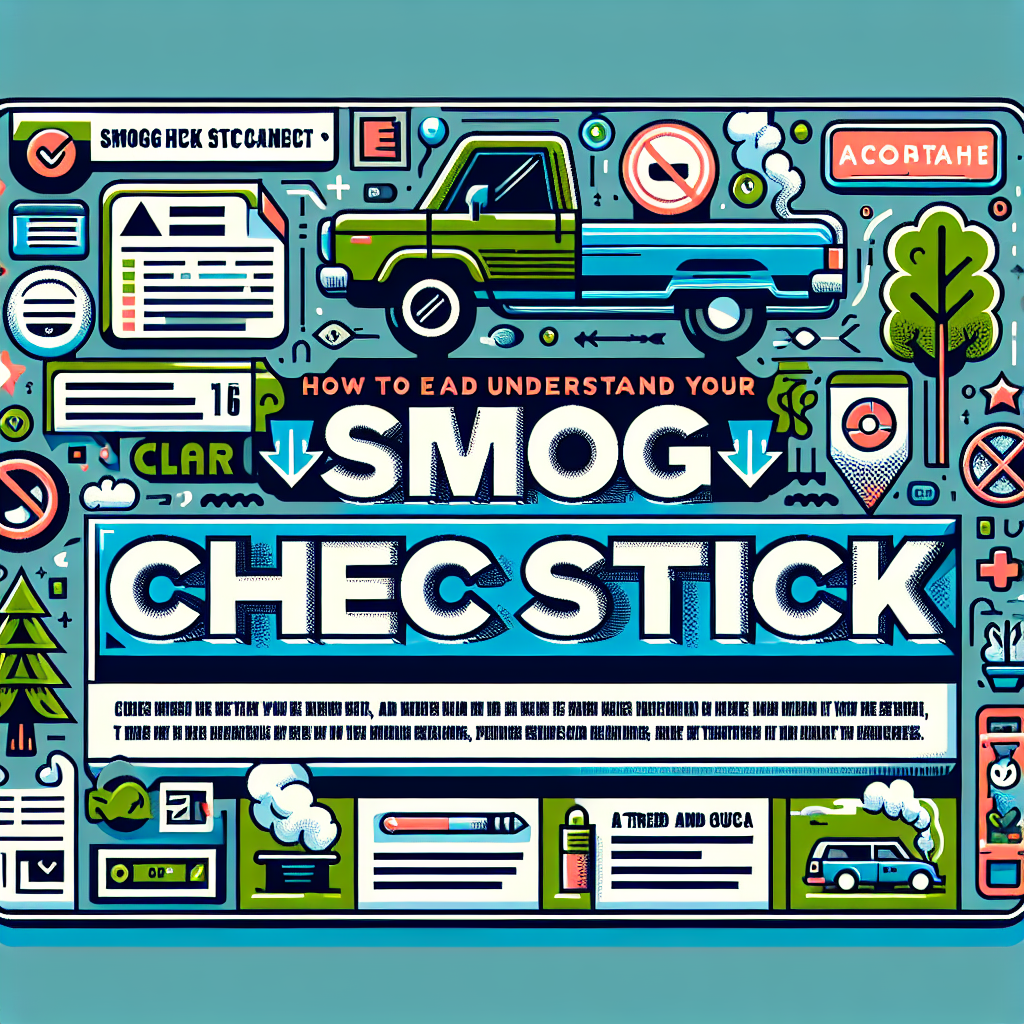How to Read and Understand Your Smog Check Sticker
Keeping your car following state emissions rules isn’t just about keeping the air clean—it’s also about making sure your car is safe to drive. One important way to show compliance is through your smog check sticker. In this blog post, we will learn what a smog check sticker is, how to read it, and why it’s important for your car’s health and the environment.
Understanding the Basics
What is a Smog Check Sticker?
A smog check sticker is a label stuck on your car. It shows that your car passed the emissions test required by your state. This test makes sure your car’s emission systems work right, helping to reduce air pollution.
Purpose of Smog Checks
Smog checks are important for both your car’s health and the environment. They find issues with your car’s emissions systems that might cause air pollution, promoting cleaner air and better health for everyone.
State Regulations and Requirements
The rules for smog checks are different in each state. It’s important to know the rules where you live, like which cars need testing, how often you need a test, and any exceptions that might exist.
Components of the Smog Check Sticker
Once you know what to look for, understanding your smog check sticker is easy. Here’s what you’ll typically find on the sticker:
- Expiration Date: Tells you when your next smog check is due. This helps you avoid fines and stay compliant.
- Test Date: Shows when the last smog check was done, helping you track your car’s testing history.
- Vehicle Identification: Usually shows your car’s make, model, and Vehicle Identification Number (VIN), ensuring the results are for the correct car.
- Emissions Results: Tells if your car passed or failed the test, and sometimes includes numbers for specific emissions levels.
Each part of the sticker gives you important info about your car’s emissions compliance and helps you stay organized with regular maintenance.
Interpreting the Results
Reading the Emissions Results Section
The results on a smog check sticker usually tell if your car passes or fails the test. Here’s what these terms mean:
- Pass: Your car meets the emissions standards set by your state.
- Fail: Your car doesn’t meet the standards; it needs repairs.
- Not Applicable: Means a part of the test doesn’t apply to your car type.
Understanding Emissions Standards
Emissions standards are rules to control the amount of pollution a car can put out. If your car fails, it might be letting out too much pollution, which is bad for the environment and health.
Why the Expiration Date is Important
Consequences of Missing Your Smog Check Renewal
If you don’t renew your smog check on time, you might get fines, suspended registration, or other penalties. Make sure your car stays compliant to avoid these problems.
Setting Reminders
Use digital calendars, reminder apps, or sticky notes to remember your smog check renewal. Setting reminders a month in advance gives you time to prepare and schedule a test.
What to Do If Your Vehicle Fails the Smog Check
Failing a smog check isn’t the end of the world, but you need to take action. Here’s what you can do:
- Identify the Cause: Common reasons for failing include bad oxygen sensors, old spark plugs, or broken catalytic converters.
- Get Repairs: Talk to a professional mechanic to find and fix problems causing the failure.
- Consider Repair Assistance: Some states help with repair costs to assist your car in passing the re-test.
- Re-test Your Vehicle: Once repairs are made, schedule another smog check.
Maintaining Your Vehicle to Pass Smog Checks
- Regular Maintenance: Routine checks and maintenance, like oil changes and tune-ups, help your car run well.
- Use Good Quality Fuel: This reduces the risk of build-up and emission problems.
- Check for Dashboard Lights: Fix any “Check Engine” light alerts to avoid bigger emission issues.
FAQs about Smog Check Stickers
- How often do I need a smog check?
Requirements vary by state, but tests are generally needed every two years for older vehicles. - Can I drive if my vehicle fails?
Some states give you time to get repairs and pass a re-test. - What vehicles are exempt?
Classic cars, hybrids, and some zero-emission vehicles might be exempt, but rules vary by state. - How much does a smog check cost?
Costs differ, usually between $30 to $70. - What happens if I ignore the smog check requirements?
Ignoring them can lead to fines and stop you from renewing your vehicle registration.
Conclusion
Understanding your smog check sticker is vital for making sure your car follows state emission standards and helps protect the environment. By staying informed about what the sticker means and maintaining your vehicle, you can avoid headaches and contribute to cleaner air.
Call to Action
If you need a smog check, or if your car failed one, let the experts at Tags Clinic help. We’re located at 3845 University Ave, San Diego, CA, or you can call us at 619-777-9046. We offer quick, convenient services to make it easier for you to comply with vehicle rules. Book an appointment online today!
Additional Resources
- California DMV Smog Information
- Local Smog Check Facilities in San Diego
- Environmental Protection Agency Vehicle Emissions Standards
Remember, taking care of your smog check needs doesn’t have to be stressful, and with Tags Clinic, it isn’t!
